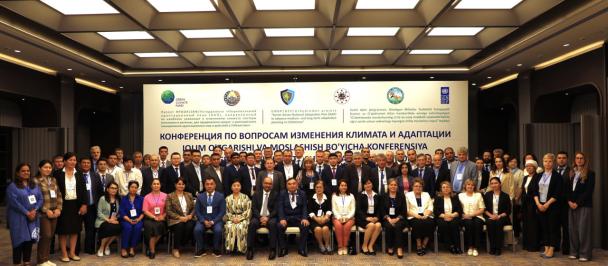The first Nearly Zero-Energy building constructed in Uzbekistan
November 23, 2022

Earlier this year, construction of the first nearly-zero-energy house was completed in the Yoshlik mahalla of Nurafshan city in the Tashkent region. The building has been constructed within the framework of the joint Project of the UNDP and the Ministry of Construction of Uzbekistan: "Market Transformation for Sustainable Rural Housing in Uzbekistan'' implemented with grant support of the Global Environment Facility (GEF).
The pilot nearlyzero energy building has been built for the first time in Uzbekistan with the use of available modern technologies and construction materials that ensure a maximal thermal insulation of outer walls, floors, and roof. This provides high thermal performance of the building, which significantly reduces energy consumption in comparison with ordinary uninsulated buildings. The building orientation ensures a maximum exposure to the sun light to use its heat in the winter time, whereas in summer time it helps to minimize the effect of the summer heat. Solar photovoltaic panels of 16kW were installed on the roof of the building which generate electrical energy sufficient enough to cover all household needs. Surplus energy from solar panels can be sold to the local grid.

In a nearly zero energy house the total amount of energy used by the building each year is equal to the amount of electrical and thermal energy generated using renewable energy systems. This is also achieved through architectural, planning and construction solutions:
- proper orientation of the building
- improving thermal insulation of the building’s envelope
- air-tight doors and windows
- shading elements
Moreover, the following technology is used to minimize energy consumption from the grid
- heat pumps
- solar photovoltaic system for power generation;
- solar thermal collectors for hot water
- high-performance windows, and
- waterproofing and thermal insulation of the building structures;
According to recent studies, a standard non-energy efficient house in Uzbekistan consumes an average of 320-390 kWh/m2 per year. The estimated energy consumption of a nearly zero energy building is 60 kWh/m2 per year due to the high energy efficiency of the building, which is 6 times less than that of a non-energy efficient house.

A two-storey house, built on a plot of 0.04 hectares, has a total useful building area of 164.2 m2 for 6 rooms, a kitchen, a garage and a utilities room. The total cost of the facility is $150,000, including the cost of all green installations of $36,000.
At the presentation of a nearly zero energy building has been attended by UN Assistant Secretary-General Haoliang Xu, Khokim of Nurafshon city Muzaffar Saliev, Deputy Minister of Construction Shukurullo Zhakhongirov, and Director of the Department of Energy Efficiency under the Ministry of Energy of the Republic of Uzbekistan Muzaffar Khakimov.
«This project has a high potential in terms of energy saving, from the standpoint of Uzbekistan's contribution to the reduction in greenhouse gas emissions. Wide dissemination of such buildings will help saving energy in the context of growing energy consumption. Therefore, I am glad that this project has been completed», - said Haoliang Xu.
«Uzbekistan is on the path of transition to the increase in its economy's energy efficiency and in a rational use of natural resources. We have prepared a relevant legislative framework for a strategy of transition to a «green» economy in the period from 2019 to 2030. In particular, by 2030, it is planned to increase the share of sun-generated electrical energy by 8.8%, and that's if we mention only solar energy here», - said Muzaffar Khakimov.

«The building's sustainability, its uniqueness helps to reduce its carbon foot-print by reducing the greenhouse emissions, under still worthy and comfortable conditions of living in rural areas. These are exactly the tasks that the Government gives us, therefore the Ministry of Construction of Uzbekistan together with the UNDP Project will further conduct monitoring of the demo building's energy efficiency for the possibility of further introduction of energy-saving technologies in the construction of residential buildings in rural areas», - said Shukurullo Jakhongirov.
The joint project of UNDP/GEF and the Ministry of Construction of The Republic of Uzbekistan «Market Transformation for Sustainable Rural Housing in Uzbekistan» has been implemented since 2017. The main goal of the Project is to provide the rural population of Uzbekistan with improved and affordable living conditions that do not harm the environment. A significant milestone of the Project is the developed standard designs of 24 types of energy efficient buildings, which boosted mass construction of energy efficient and low carbon housing all across the country. Additionally the Project has provided, financial and technical assistance for the construction of 1358 energy efficient and low carbon houses and apartments.

 Locations
Locations


